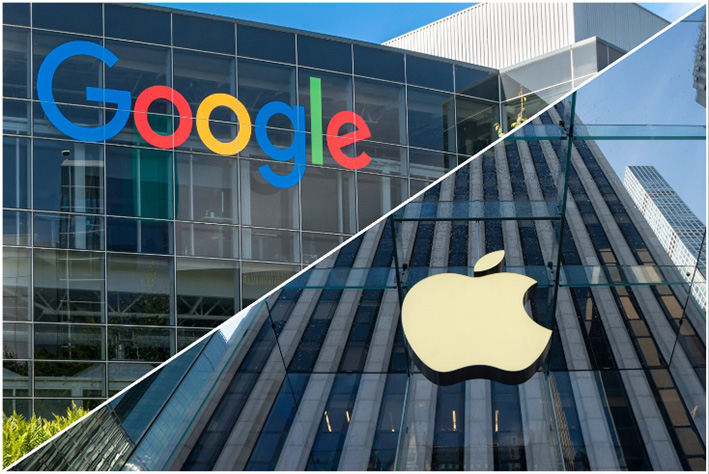All you need to know about the regulatory juggernauts heading for Google and Apple

Opinion
The ongoing regulatory and legislative actions in the US, EU and UK could transform the digital industry. Movement for an Open Web rounds up the latest and explains what you can do.
“The wheels of justice grind slowly, but grind exceedingly fine,” said Plutarch in the 1st century AD — and it seems his proverb is being proven true in the 21st century.
For years, the digital industry has known that Google and Apple were dominating the markets in which they operate. But this was taken as a fact of life; a cost of business in this dynamic industry.
Now, however, it appears that their seemingly unshakeable dominance is under threat. The platforms have — finally — come into the crosshairs of governments across the world.
The ongoing regulatory and legislative actions in the US, EU and UK all have the potential to transform the shape of the digital industry, but sometimes the flood of acronyms, investigations and court cases can be overwhelming.
So what is the current state of play with Google and Apple versus the world’s governments?
UK: The start of the story
One could argue that the tipping point for the current explosion of regulatory activity was in the UK with the January 2021 Competition & Markets Authority (CMA) investigation into Google’s Privacy Sandbox. This process led to the “commitments” that prevented Privacy Sandbox’s roll-out until the CMA was satisfied that it didn’t pose a competitive threat.
More than three years later, it seems that the CMA is still not satisfied that this is the case. Despite Google’s decision not to block third-party cookies, the CMA’s latest report into the progress of the commitments contains a huge number of fundamental questions that are still unresolved.
The process has been further complicated by the recent involvement of the UK’s privacy regulator, the Information Commissioner’s Office (ICO). Now contributing directly to the CMA’s investigation, the ICO has several privacy questions for Google that the company has yet to answer, potentially putting Google in a regulatory whirlpool from which there is no escape.
Google will point to a number of earlier ICO and CMA concerns about Privacy Sandbox that have apparently been resolved. However, these rely in large part on theoretical technical “magic” in the form of trusted execution environments and proposed governance committees that will solve nothing in practice.
From the point of view of Google’s critics (me included), this outcome was inevitable. Privacy Sandbox (despite its name) does nothing to enhance user privacy and is a blatantly anti-competitive project. It should not receive regulatory approval in anything like its current form. Ultimately, Privacy Sandbox needs to compete from a position of building trust with people.
More broadly, the CMA has also started to look at Google’s behaviour in the wider adtech market with a statement of objections to Google’s anti-competitive conduct, reflecting similar investigations in the EU and the US, and demonstrating the growing global consensus on the anti-competitive nature of Google and Apple.
EU: DMA begins to bite
In the EU, things are looking similarly challenging for both Google and Apple, primarily on two fronts.
In the first instance, the EU’s Digital Markets Act (DMA) came into force on 1 November 2022 and is beginning to bite. Alphabet, Apple and four others designated as “digital gatekeepers” have been subject to the act’s rules, which strike at the very heart of their businesses.
For example, within the DMA is a requirement for gatekeepers to ensure interoperability between software and hardware services. This may seem like a technical point, but removing interoperability has been a key tool in these companies’ arsenal, from creating locked app stores to removing the cookies that enable digital advertising businesses to seamlessly work together.
The first enforcement actions have already started looking at Apple’s lack of support for interoperability in hardware and software, but it has potentially even more wide-reaching implications.
Beyond the DMA, the European Commission has taken direct aim at Google, issuing a statement of objections in relation to Google’s abusive practices in digital advertising. This important — but little discussed — investigation found that Google is dominant in online advertising and that this, if confirmed, would be illegal under competition rules. The investigative process is ongoing and has the potential to result in remedies up to and including a break-up of Google’s advertising business.
US: DOJ focus
Regulatory activity in this area that has received the most public attention recently has been the Department of Justice’s cases against Google in search and adtech.
These two cases take aim at different parts of Google’s empire, but both potentially end up in the same place — significant competition remedies against Google potentially include structural (break-up), behavioural or that relating to access.
In search, Google was ruled to be a monopolist. The industry is waiting to find out the result of the adtech case, with hope of a similar finding given the conclusive evidence revealed in the trial.
It has been suggested that the incoming Donald Trump administration could intervene to protect Google from the outcome of these cases. However, given the search investigation started under Trump, it seems likely that he will not look to intervene.
This hope, combined with vice-president JD Vance’s enthusiasm for Silicon Valley-based “little tech”, points to a continuing environment for fundamental change.
Where next?
Whatever happens in each individual jurisdiction, change is coming. The governments of the world have acknowledged that the power of the platforms is excessive and they seem determined to act against it. We have moved on from a question of whether something needs to be done about Google and Apple to what needs to be done about them.
The form of the likely remedies is emerging. A break-up grabs headlines, but on its own may only create multiple monopolies that will need to be dealt with further down the road.
Any effective structural remedy will need to be supported by a range of behavioural and access remedies that address the root issues posed by the platforms’ dominance, such as opening up search to competition or mandating interoperability in digital advertising.
What is essential is that agencies, advertisers and adtech businesses are not passive players in this process. Regulators worldwide are seeking input from market participants as evidence in their cases against Google and Apple, and few have yet come forward.
If you want an industry free from the crushing weight of monopolists, then it is essential that you come forward, either individually or via advocacy organisations like Movement for an Open Web.
 James Rosewell is co-founder of Movement for an Open Web
James Rosewell is co-founder of Movement for an Open Web




